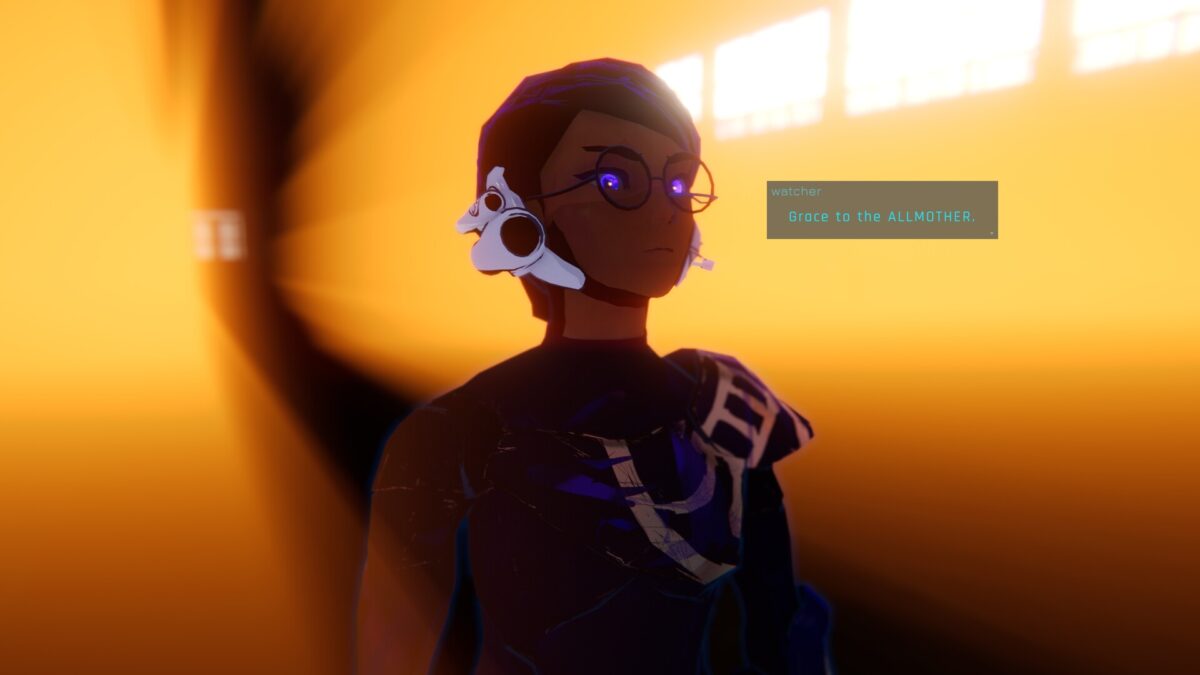I’ve been thinking a lot about 1000xResist, the debut game by sunset visitor 斜陽過客, since I rolled credits on it a few weeks ago. More accurately I’ve been thinking about it since last year, when I reviewed its demo as part of LudoNarraCon coverage. I was happy to see the game still chugging along late last year, and having gotten it in my hands and played through to completion, I can’t stress enough how much of a fucking barnstormer the game is. It is a game that starts by burying a hook in you so deep you’d need extensive surgery to remove it, and immediately throws a dozen narrative plates spinning into the air above you. The act of playing the game is the act of very carefully moving around these spinning plates, the poles they’re balanced on wobbling slightly with every small decision you make.
The thing is, though, 1000xResist is not a game that hinges on your decisions. Those have already largely been made for you. The character(s) you play as exist in a context where because everyone is a clone of Iris, the ALLMOTHER, their main immediate distinguishing characteristics revolve around things like color and function. Your function – the Watcher’s function – is to watch. This is the gameplay verb at the heart of 1000xResist: watch. observe. understand. We dive into Iris’s cached memories to learn who she was, to understand the person behind the worshipped god of this pocket utopia. We learn what other Watchers before us surely knew: Iris was a girl, a teenager, plucked from her family in the midst of an extraterrestrially-driven apocalypse. She was subjected to tests and held in a secret facility while everyone she ever knew died from a virus that drained all their bodily fluids out through their tear ducts. She was somehow chosen to be immune to the virus, immortal, undying. She was cursed to watch the end of all things.
It goes without saying that Iris was neither an especially good person, nor unequivocally bad. Teenagers are shitty to begin with, judgmental and mean, lacking the filter of etiquette adults gain through years of painful trial and error. She also existed at a tension point as a first-generation Chinese-Canadian whose parents had fled Hong Kong after the Umbrella Revolution. She was shitty to Jiao, another recent immigrant to Canada, who took her abuse because she wanted to find some kind of acceptance in an unfamiliar place. She was distant and aloof to her other classmates. Under normal circumstances these events and people and behaviors wouldn’t take on the grave importance of a foundational religious text. But what else does a society of clones base their system of moral values on, especially absent all other information of the outside world? What else would they do, since she’s all they’ve got?
The end of 1000xResist unfurls after hours of plans and plots being undone by the vicissitudes of chance. An alien presence – the same one that caused the end of the world in the first place – decides to give us a chance to shape the world in our image before they leave and take the virus with them. It is the kind of chance all manner of armchair statecraftsmen wish they could have: to form a society with just a few simple choices.
But as you are wandering the waterlogged room, discovering what each small faction of Iris-clone or Jiao-clone represents and what they want, individually, you realize that you’re shaping the world based on your own interactions with these people. You’ve met everyone in the room, talked to them at least once. You could easily make a society that looks just like the one you just left, keep everything exactly as it is. You could also just as easily choose to end it all by removing everyone. Making this choice is suddenly much harder than it seems.
You sit with the choice you made and hope it’s a good one. You won’t know what the future holds until it happens.




